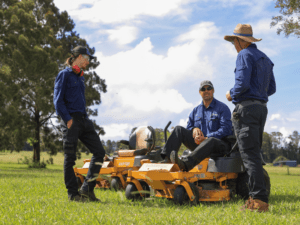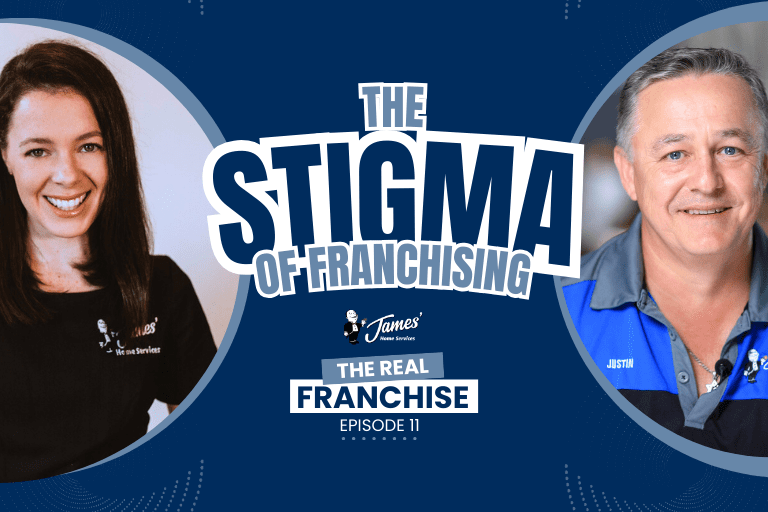Watch the full episode of The Real Franchise Episode 11 – here
Rhiannon Hello and welcome to The Real Franchise, a video series designed to deliver real information, real answers, and real insights into franchising. This series is brought to you by James Home Services Australia. I’m the CEO and Justin is one of our owners and our head of new businesses. Together, we’re going to tackle all of the big topics unscripted, unplanned and unfiltered.
No sales, no fluff. We’re just going to give you the information straight up. Today’s topic is all about the stigma of franchising. Let’s go there. Let’s bust the myths that franchising is the worst thing in the world. We have both had so many times. Justin is our head of new businesses. You are the person who walks those potential new business owners in and network through the on the information and onboarding process.
I engage with industry frequently, and I am constantly hearing, you know, that stigma in the stereotype. And if you’ve clicked onto this video, then I’m hoping that you’ve heard it too, and you’re open to just having a conversation about why this stigma exists and also busting some myths around it. Because, frankly, in 2024, there’s a lot of reasons why the stigma is very outdated and we just need to have a chat about that.
Justin, I’m going to try to you first mentioned before you hear it at the coalface as I head of new businesses, your role in our company, as well as being a part owner, is actually taking every single person who makes an inquiry about joining our network through an information process. And if at the end of that, they choose to commit to becoming a franchisee, then you kick off the onboarding process with them.
I’m positive. You must hear quite frequently people having fears about joining a franchise network or reservations, or just being unsure and a little bit uncomfortable because of the stigma and the stereotype that is attached to franchising. What sorts of things do you hear at the coalface?
Justin What starts right in the very first conversation? When I first call someone back? It’s almost like for most of the calls that I do with people, you can just sense this, this real fear. It’s like they’re playing with a snake, you know, and oh, you know, so what’s the catch? And what’s this and what’s that? And as we take this is what we do, this long information journey so that people can.
Yeah. We’re transparent. I can talk to anyone on this. No secrets. And you just gradually see these walls come down and but you know, they said old saying where they smoke this fire. All right. And the challenge I think our whole industry has had over the last 5 to 10 years particularly is, is there’s a lot of smoke.
Right. And the challenge is people to get actual information, you know, like I can remember 20 years ago, colleagues and friends of mine, that had franchises looking at franchises, you know, family and friends just going and myself included, going, wow, that’s awesome. Go for it. You’re going to be awesome. You’ll make make millions. You know, and that, you know, through the 80s, 90s and early 2000, that was the public perception, by and large, about a franchise.
You said, yeah, celebrate it. Now, if you go to your family and friends and say, I’m looking at buying a franchise or joining a franchise, you probably get a very different reaction.
Rhiannon Though. Why is that? Why is it because it seems to have changed on a dime? You know, media coverage nowadays for the franchising industry is by and large, quite negative, which is really unfortunate given the role that franchising plays in our economy. And we can get to that later. But why do you think that perception has changed? Because you’re right.
20 years ago the industry was celebrated. It was revered. You were you were a savvy businessman or businesswoman. If you were making a decision to join a franchise network, people thought that, you know, that was a really good decision. Why is it changed so much in really such a short space of time?
Justin Well, what the country saw happen, and I think it was the same in the US is because franchises were so successful and there’s good reasons for that. And we’ll talk about that. Why franchises are successful. All sorts of people jumped on the bandwagon. And you saw through the 80s and 90s just this plethora of franchises start in Australia, where everybody jumped in and tried to franchise their business without the understanding of what it actually is that makes a franchise succeed.
So sadly, what we saw happen, particularly in the hospitality industry, is there were a lot of franchises that were set up that had, you know, massive infrastructure costs and demands on the franchisee for, you know, fit outs and refit outs and all these sorts of things and high shop leases and those sorts of costs. And then the fee structures were just unworkable.
And what we saw was, and this has been in the press and this is what people have seen, and this is what is is factual. You know, that some of these franchises had there was no way a franchisee could build a successful business. You could be working you guts at doing everything, and you still lost your home.
And that’s what happened. And that’s what factually is out there. And sadly, it was a group, you know, like a number. And, the government stepped in and I guess, you know, it was our CEO might be able to talk a bit more to this. You know, the government brought in this thing called the franchise code of conduct that every franchise has to abide by.
And I’m gonna throw over to you to just talk about how does how did that address some of those things?
Rhiannon Yeah. Well, what we really say in franchising and what the law found to to what the law found when it started to have these sort of cases presented out of the 80s, in the 90s, of these franchisors who had what an and what essentially summarizes exactly what you described is that people built great businesses, and then they saw a business opportunity for expansion using the franchising model.
And the franchising model is the most powerful business model available to us in the world, on the planet. Full stop. You can’t change my mind. It is. And what happened was, because of that, a lot of people got on board and a lot of people got on board that maybe, as you indicated, didn’t really understand the importance of setting it up correctly.
So what we saw was an awful lot of people failing, or a lot of people not being supported adequately in their franchise businesses. Of course, what that contributed to was an increase in, legal cases against franchisors. Now, when you say an increase in legal cases all around the same topic, the government goes, oh, that’s interesting.
That industry over there doesn’t really seem to be doing the right thing by the people in the industry, should we regulate? So the government stepped in and said, this is currently an unregulated industry. It was a free for all. Franchisors could do anything they pleased. There were no rules, no regulations, no parameters. So franchisors were left to their own devices, and it was up to individuals as to whether they set the network up in a way that actually benefited their broader network, or set the network up in a way that potentially just benefited their own interests.
Government stepped in at a point and said, no more. We need to protect the smaller party. We need to protect the mum and dad business owners who are putting their lives and their houses and their families on the line to join your network. And honestly, as a CEO of a franchised network, I think that’s sensible. I think they should be protection for the smaller party who doesn’t have access to the same level of experience and intelligence and understanding of the industry that those in the industry every single day of their lives have.
So the government implemented what we now know to be the Australian Franchising Code of Conduct, and that code of conduct has gone through a number of different updates and iterations over the years. But essentially what it is, it’s it’s our rulebook and it’s a document that frankly, I know, like the back of my hand, I’ve read it more times than I would like to admit to you.
but it’s our rulebook. It’s what we have to do to take care of our franchisees. Now. They’re a franchisors out there who are dead against a lot of the code and what it stands for, and they will fight tooth and hammer to tell you that it just simply adds red tape and barriers to business success in our industry.
And frankly, I think those are the franchisors that maybe need the code the most. I don’t have an issue with the code. I never have any. I’ve never had an issue with the code. I actually think that the code is adequately providing protection to the smaller party, to the franchisee in this case, and frankly, as I write the code, all it is, it’s frankly most of it is commonsense.
This is how you should take care of someone who is invested in your network, anticipating success and results. Because of that, it’s just 101. It’s just common sense. It’s just this is how you take care of someone who’s invested in you. So the government introduced a code of conduct, and it’s our rulebook. That’s the easiest way to describe it.
For anybody listening to this. There’s nothing complex about it. And it just sets a standard of behavior and actions that your franchisor is legally bound to follow. Simple. That’s all it is. It does provide protection for the smaller party. It is important. I don’t believe it adds unnecessarily, unnecessarily significant amounts of red tape to the process. What it does is it adds protections, it adds checks and balances, and it keeps people honest.
And frankly, if you’re already honest and you’re already operating on the right side of franchising history, then the code is nothing to be concerned or worried about. And for us, the code is nothing to be concerned or worried about. Simply acts as a guide. But if you’re steering your ship with a strong moral compass, the code, you’re not ever really going to find yourself on the wrong side of it.
To be honest.
Justin Yeah, so that’s one of the big reasons I think that, you know, if people have that but affect us, you know, the terrible horror stories really are from 20 years ago or so that the code was introduced to address. And like you said, the code fundamentally at its grassroots says that we have to at all times act in good faith to one another.
And and that’s we did our previous episode. We’re talking about the moral compass that we used to drive, James. I mean, that’s how we do business anyway. Yeah. So I thought there was a code of conduct. That’s why it doesn’t really change the way we do business, because that’s the way we do business.
Rhiannon It’s not the work that we do because of the code of conduct. Everything in our business that we do is because that’s the right way to take care of people who have invested in our network. That’s the right way to grow businesses in our network. That’s just the right way to treat other human beings.
Justin Yeah, yeah. And sadly, and I must admit, this frustrates the living daylights out of me. That stigma is so many people that would do awesome in this business have that implanted, you know, on our I, constantly monitoring our Facebook advertising and and you know, obviously people comment on that and you get all sorts of comments. And, and there was one just the other day with someone going, why would you join a franchise?
These guys take over half of your money.
Rhiannon And it’s like, that’s so untrue. Exactly like it’s how things.
Justin Are a percentage, I would say well be more concerned in my opinion, more concern of a network that has set fees, you know, and, and network. We charge a small percentage. So the only way we can really make money is by helping you make money.
Rhiannon Yeah. Well and it’s, you know, those individuals and look, you know and I’m sure that that person that committed it, you know, it’s it’s come from somewhere. Right. It’s it’s maybe it’s maybe a lived experience. And if it is goodness. You know, I’m, I’m sorry that that’s been their experience. You know, that they’ve not had a great one with the franchise network.
But nine times out of ten, what we find is it’s not someone’s personal experience. It’s and it’s not even an experience of a family member or an auntie or an uncle or a friend or colleague. It’s actually just a feeling that they have gathered, and it’s a combination of, you know, media coverage or stories passed around third, fourth, fifth hand backyard barbecues, you know, and it’s it is like, say, it’s frustrating because it’s it’s not really a personal frustration and it’s not really a frustration of our business, but it’s unfortunate for the people who have that view that that is their set view.
And sometimes I wish I could just say, just give us ten minutes. We’re human beings, you know, we just want to operate a network that does the best thing by our franchisees. We just want to help you grow businesses. We’re not out here to try and steal all your money. We’re not out here to try and stitch you up.
We’re not trying to screw you over. We’re not trying to end your life. We’re not trying to put a stop to your family aspirations. None of that, actually. We want all of that for you. And we know we can support you to get it through our system and through our network. I yeah, I sometimes wish I could just have ten minutes with someone to say, hey, I’m a human being.
I had the same fears when I joined this network that you have now, and actually for years on the inside of the devil has taught me that actually, we steer the ship with a strong moral compass and we do that because that’s the right thing to do, not because the code tells us to do it, but because we already know that’s the right thing to do.
And look, you know, there’s there’s a place to acknowledge that there are still franchisors out there who make unfortunate decisions, you know, whether it’s whether it’s knowingly or by mistake, you know, things happen and experiences are had in franchising that aren’t great for franchisees. That’s worth acknowledging. And those things still happen. Which which is why it’s so important that if you’re going down the road of investigating a franchise network, you’ve got to do your due diligence.
You’ve got to ask all of the questions. You’ve got to be looking for those red flags. And if you see one pop up, you’ve got to dive deeper and you’ve got to trust your gut. And if you’re not feeling confident with the information and the presentation that a network is giving to you, trust that. Then maybe there’s a good reason for that.
But I will say also, it’s very valuable in life and also in business to have an open mind and franchising. Franchising is enormous in this country. I don’t actually think that a lot of people have an understanding of just how significant our industries and the contribution that it makes to our economy. So if you think about, the money that franchising generates through its businesses and through the model, through the whole franchising industry in Australia, every single year, the franchising sector contributes around $180 billion to our Australian economy.
And that’s a big number. So to put that in perspective, for anybody listening, that’s more than our agriculture and our mining sectors combined. So you think about what drives our economy here in Australia. You think agriculture and mining. You know, we’re taught that we are built on the back of agriculture and mining. little old franchising over here with a with a terrible, terrible stigma attached to us.
And with so many people fearful of us, we actually eclipse the contribution that those two other industries make to the economy every single year. In that contribution, there are around 1100 franchised networks. There are around 90,000 small businesses enabled through the franchising model. So that’s 90,000, you know, mums and dads that own businesses and are supported to own their businesses by franchise networks.
And there are over 650,000 people who have jobs in the franchising sector. So, you know, our industry, which has attracted over the years, you know, a pretty shocking reputation, is such a significant contributor. You take that out of our Australian economy and we fall over pretty quickly. So, yeah, that, you know, I, I absolutely acknowledge that the horror stories have been real in the past, and there continue to be franchise networks that maybe aren’t focused in the right places.
But the majority of us are out here just trying to build healthy businesses in our networks. And the majority of us genuinely believe in the power of franchising to enable the power of small business in our economy. And small business is really important. Small businesses in these countries, actually what we’re built on, we have built on small businesses.
98% of the businesses in Australia are small. Businesses were built on the back of small business. And franchising is an industry that actually supports small business. So we are an incredibly important player in the puzzle. That is our Australian economy.
Justin Yeah, yeah, yeah, I love having the discussion because I have it often with people who are so skeptical, you know, you know, yes, I’m looking at starting my own business. I’m looking at going out on my own or I’m looking at doing a franchise, but I’m really thinking I’m going to do my own thing. Yeah, convince me why.
Or even look at a franchise. Right. It’s that sort of conversation and if you’re listening to this and you want to have that conversation, put through an inquiry because there are good facts, there’s reasons franchises are so successful. You know, I look at Macca’s I can’t stand their food, but are they a successful business? You know, like, but it’s the selection criteria.
It’s almost impossible to get get one because lay it. So, sought after and successful. Yeah. And, and this reasons for that, you know, it’s not just a magical thing that these businesses are successful, you know, this people when they’re throwing these comments at that to me about why would I do a franchise? I just sort of like, well, walk into any shopping center.
Almost every shop you look at in any shopping center, nearly all of them are franchises. Why? Yeah. You know, if there’s such a terrible thing, why?
Rhiannon Yeah, I.
Justin Think there’s reasons that’s like you said, I come from an agricultural background, right? That’s that that you shared with me recently that blew me away. You know, and it’s interesting because I was just thinking, as you were talking before, farming and agriculture has a stigma, a similar stigma. You know, farmers are destroying our environment. It’s like, well, if you actually go any work on a farm or live on a farm, you will see that most farmers love their land more than you ever possibly could, you know, like and I do.
So yes, there’s the there’s the bad few that given. So I mean franchising it’s it’s interesting the same parallels but.
Rhiannon It’s in every industry isn’t it. You know, it. Yes. There’s, there’s a common thread which is in every industry, in every sector, in every workplace, in every part of society, there’s always a small handful that choose the wrong path, that make unfortunate decisions that don’t do the right thing, the don’t stick to the rulebook, that don’t act with integrity.
There’s always that small portion in everything in life. You will find that small portion. Franchising is no different. You will find that small portion. But what that also means is that the other 99.99999% of the industry is out there just trying to support our businesses to grow successful businesses in their local communities. You know, franchising is successful for a lot of reasons.
And I think that you’ve, you know, you’ve I think that’s a great topic to get into in a lot of detail in another episode is why is franchising so successful? Because there are an awful lot of reasons. But the number one reason that it’s successful is and and I’m going to use an analogy to explain this, and, and it’s, it’s pertinent because right now as we’re recording this, we’re on the tail end of the 2024 Paris Olympics.
And the analogy is everyone starting on the start line of that 100 meter race, the gold has the same goal. They want to win.
So but the person that wins, it comes down to having great systems and processes, having great trainers, having a great coach, having a great diet, having a great routine, being consistent in implementing all of those things. The winner is the one with the best systems and process is everyone has the same goal, so it’s not the person with the best goal that wins, it’s the person with the best systems and processes.
Justin Exactly.
Rhiannon In franchising and in any small business, right? It’s the same franchise network, not a franchised network. It’s the same. You start your business with the same goal as everybody else who’s ever started a business. No one starts to fail. No one in history has started a business with the goal of failure. We all start with the goal of winning, of being successful, of building a successful, sustainable business.
The people who actually get there, the people who actually succeed in business, are not the ones with the biggest, most aspirational goals. They’re the ones with the best systems and processes. And how that makes franchising successful is the very foundation of franchising is having systems and processes that, when implemented, work.
Justin Yeah.
Rhiannon That is indeed the entire model of franchising, summarized in one sentence franchising is systems and processes that work when implemented full stop.
Justin Very good. That’s awesome.
Rhiannon this is a quite a confronting conversation, really, isn’t it? You know, particularly to be in the industry facing what is said about us so often, so I hope for anybody listening that just maybe we have challenged your thinking in a healthy way. I hope that you feel that this has been constructive. I hope that you feel that this has been informative.
I hope, I hope that you don’t feel we’re just sitting here trying to justify why a franchised network is worthwhile, because maybe to you it’s not, you know, maybe, maybe there are other business models out there that, for you as an individual listening are a better fit for you. And that’s okay. Franchising is not for everyone. And one of the wonderful things about our network is that if you make an inquiry with us and through conversations and through our journey of getting to know you, if we actually get to a point where genuinely we feel like what you’re looking for is not what we offer, we’ll tell you to just be upfront with you.
We’re not going to try and sell you a franchise if actually we don’t think that that can achieve for you what you’re looking for. And I hope that through this video series, we can send that message. You know, we’re not out here for numbers for the sake of numbers growth, for the sake of growth, sales for the sake of sales.
We’re not out here to fuel the stereotype. We’re out here actually trying to do the opposite. We’re actually out here trying to prove that franchise networks make a really significant contribution to our economy. We have a very small, small role in that. But we have a big responsibility, and the responsibility is to walk the walk and talk the talk is to do the right thing by the people who invest in network and who are in our care.
That’s really our biggest goal. So we might leave this episode here if you liked it, I found it helpful. Leave us a like or a comment that really supports our channel and helps YouTube to know that the content we’re sharing is relevant and and can share it with more people like yourself who might have an interest. If there’s a topic you’d like us to discuss, then leave us a comment below and we’ll get to it.
And, thank you for spending 20 minutes of your day with us, and we hope that you listen in for the next episode of the Real franchise.
More Information on subscribing to your own business
Want to speak to a real person about joining our network? Get in touch directly with our National Director of Sales; Justin Kelly on 0438 780 363
Want us to contact you? Submit an enquiry













